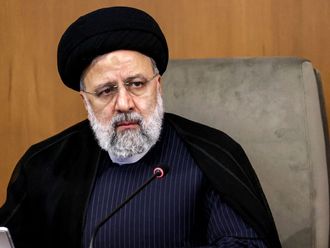BAGHDAD: They have fled the country, their pockets full, or been released from prison under amnesties: despite Iraq’s “war” on corruption, those guilty of embezzling state funds often evade justice.
Even before he declared victory against Daesh in early December after a three-year battle, Prime Minister Haider Al Abadi said the country’s next fight would be against graft, vowing to “surprise the corrupt”.
With billions of dollars in state money flowing into phantom projects used as vehicles for embezzlement, Iraq ranked as the 11th most corrupt country in the world in Transparency International’s 2016 corruption perception index.
But Al Abadi’s fight against corruption is “still in the realm of theory” at this stage, according to Iraqi analyst Hesham Al Hashemi.
“Nothing will change as long as those who protect corrupt actors in the economy, security and the military are still comfortable,” he said.
Member of parliament Majida Al Tamimi said Iraq’s corruption had grown “from the size of an ant to the size of a dinosaur” since the US-led invasion of 2003 toppled longtime dictator Saddam Hussain.
Fighting it would be “difficult, fiercer than the fight against Daesh”, she said.
“There are corrupt people in every party,” she added. “The war will be hard and it will need international and domestic support” — including from political parties which themselves have corrupt members.
Some fear that little can be done to tackle the issue.
One politician told journalists that stolen sums of less than $60 million “can be seen as honest; from there upwards we can speak of corruption”.
An official told AFP the government has sought help from Western organisations and the United Nations to track down missing funds.
Rahim Al Darraji, a member of the parliament’s transparency commission, said some 6,000 “phantom contracts” had been signed to siphon off public money since 2003.
Through front companies running construction sites and building infrastructure that only existed on paper, some $228 billion had “gone up in smoke”, he said.
That is equivalent to three times the annual budget and more than Iraq’s GDP.
Analysts say such massive corruption helps explain why Iraq is sorely lacking in infrastructure and industrial or agricultural development.
Iraq, which is Opec’s second largest producer, has been reduced to importing electricity and refined petroleum products.
Some projects do reach completion, but bribes form a large part of the price paid by the state.
Al Darraji said that during the tenure of Al Abadi’s predecessor, Nuri Al Maleki, the defence ministry bought 12 aircraft from a Czech manufacturer for $11 million — and a further $144 million in bribes.
The Supreme Council of the Judiciary said in a report that “many decisions of the justice department are never implemented”.
Iraqi newspapers often report on officials, collectively suspected of embezzling billions of dollars, fleeing the country.
Former Basra governor Majid Al Nasrawi is among the wanted suspects on the run.
A prominent Basra businessman later alleged in a television interview that Al Nasrawi had taken a 15 per cent cut on every contract — five per cent for his party and 10 per cent for himself.
The state’s anti-corruption committee, overseen by the prime minister’s office, has called for tougher laws. But first and foremost, it calls for an end to amnesties for the corrupt.
Supreme Judicial Council spokesman Abdul Sattar Bayraqdar slammed a law which provides for the release of corrupt officials if they agree to return the money they embezzled, arguing that profits from stolen funds remain out of the state’s reach.
Another judicial official, speaking on condition of anonymity, also criticised the legislation.
“For example, if someone a decade ago stole two billion dinars that have since earned twenty, they can just pay back the two billion and leave prison,” the official said.
“It’s like a bank loan.”










